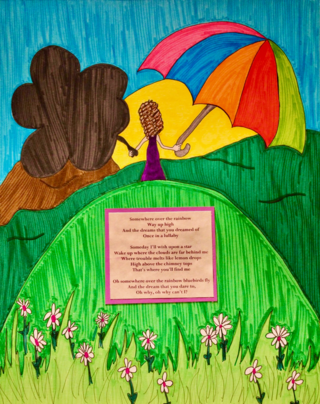Pregnancy
Meghan and Harry's Rainbow Baby
The Orpah Winfrey interview isn't the first time Meghan Markle broke taboos.
Posted March 16, 2021 Reviewed by Lybi Ma
[Trigger Warning: baby loss, stillborn, miscarriage, infertility]
Our research discusses the importance of taking the “target off mothers' backs” related to mothering and parenting, especially regarding infertility, miscarriage, stillbirth, and baby loss. While folks of all genders have babies and do the work of parenting, society reserves its harshest judgment for women. Hundreds of years ago, women were thought to purposefully not become pregnant or end a pregnancy to stop the patrilineal progression and punish their husbands. In the 20th- and 21st-century, women are accused of being everything from “absent” or “refrigerator mothers” to “helicopter” or “tiger” mothers (for some, this is a compliment) to the racist and statistically inaccurate “welfare queen.”
We’ve seen this happen to Meghan Markle time and again, and her public treatment was so horrific that she and Harry decided to step away from their roles in England’s Royal Family. We support their choice and wish them peace and privacy.
Meghan Markle and Prince Harry announced Valentine’s Day 2021 that they are having a “rainbow baby” after a miscarriage in July 2020. Meghan wrote a powerful NYTimes op-ed on the losses so many families face and do not know how to—or feel safe enough—to share. With critics at every step, asking you what you ate, how much you exercised, what “milestones” your baby met, when “the next one” is coming and why you can’t easily and blithely balance it all, it is no wonder that families keep devastating loss to themselves. As Markle wrote:
Losing a child means carrying an almost unbearable grief, experienced by many but talked about by few. In the pain of our loss, my husband and I discovered that in a room of 100 women, 10 to 20 of them will have suffered from miscarriage. Yet despite the staggering commonality of this pain, the conversation remains taboo, riddled with (unwarranted) shame, and perpetuating a cycle of solitary mourning.
We were reminded again of Markle’s ability to share stories of vulnerability and loss during her recent interview with Oprah Winfrey. She discussed the summer arrival of their baby, a child Markle revealed would be the couple’s last. When Markle talked about finding her voice again, it was clear that she wanted to share her story of loss.

What happens when you tell your story of grief? Perhaps the target becomes fuzzier or the pain dispersed. For Meghan and Harry, this baby will come after the storm, and this baby symbolizes joy and something very positive (or a pot of gold) after trauma and loss. They are acknowledging the baby that they lost. Their pregnancy and birth may bring up many emotions for Meghan and Harry, such as fears of loss and shame about their previous baby. They will need a lot of emotional support. As we wrote in an earlier Psychology Today post: How can we support people during and after a pregnancy loss? Offer a shoulder to cry on, validate their experience, and don’t try to find the silver lining; there is no silver lining, even if they have already have a child. Offer comfort, company, and space, as well as time to grieve. Listen to their fears, worries, even the darkest ones, and don’t react strongly or say hurtful things: “Don’t feel that way. You’ll get pregnant again.”
Racist mom-shaming directed at Meghan Markle’s parenting is a type of institutional oppression and injustice. It is also a type of interpersonal violence as well, something that perpetuates larger social mechanisms. This conflict stops us from working together to rid society of broken systems. Insufficient maternal and paternal leave being one, for example.
How can we acknowledge the loss that families suffer? What can we do to celebrate all “rainbow babies”? Can we offer judgment-free joy to parents embracing the joy of pregnancy alongside the grief or loss? What can we do to support all families? How can we create spaces for healing together? The first and most important thing is breaking the silence—something Markle is now known for.
Thank you, Meghan and Harry, for sharing your story. We know it will help others feel less alone.


